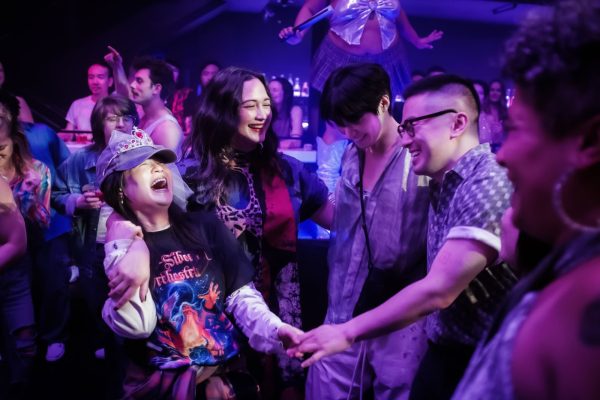The Wedding Banquet, 2025.
Directed by Andrew Ahn.
Starring Bowen Yang, Lily Gladstone, Kelly Marie Tran, Han Gi-chan, Joan Chen, Youn Yuh-jung, Bobo Le, Camille Atebe, Jeffrey Liang, Emma Yi, Françoise Yip, Marlee Walchuk, Jeremy Hoffman, Sherine Menes, and Nick Preston.
SYNOPSIS:
A gay man makes a deal with his lesbian friend: a green-card marriage for him, in exchange for in vitro fertilization treatments for her. Plans evolve as Min’s grandmother surprises them with a Korean wedding banquet.
The Wedding Banquet is a tender LGBTQ take on found family. Smartly, co-writer/director Andrew Ahn (working alongside James Schamus, reworking the 1993 Ang Lee film for the modern-day) doesn’t tether the story to one character as a central focus. By freely moving between them, whether observing them alone, at work, or engaging in an activity, there is a greater understanding of who these people are. That’s crucial considering these are also flawed human beings who make mistakes and initially come across as unlikable and sometimes selfish.
Han Gi-Chan’s aspiring fashion designer Min’s grandmother, Oscar-winner Youn Yuh-jung’s Ja-Young, feels that she has let her grandson indulge in those artistic fashions in America long enough, requesting that he come back to Korea and join the soul-sucking family business. His solution is to disobey her by getting a green card. Min is also gay, unbeknownst to his grandmother, and dating Bowen Yang’s Chris. Suddenly, he proposes to Chris, proclaiming he wants to take their relationship to the next stage. He is seen through as choosing this moment due to uncertainty about his future in America.
That might make it sound like the couple doesn’t love one another, but they do. Chris also has severe commitment issues, meaning his rejection is coming more from that mindset. He knows Min desperately wants the green card, but he also knows he is loved. Nevertheless, they have an argument which gives way to Min’s next idea: offering IVF funding to their friend Lee (Lily Gladstone) in exchange for a green card marriage with her partner Angela (Kelly Marie Tran. Why the inherently wealthy Min isn’t already offering that support so they can try again (there is a history of failed IVF pregnancies) is a legitimate question to ask, especially since he is comfortable living in the garage of Lee’s family home suggesting he doesn’t necessarily care about money or a glamorous lifestyle.
Meanwhile, Angela deals with an implied once homophobic mother (Joan Chen), or at the very least, disappointed in her daughter for coming out, who has now transitioned into an award-winning LGBTQ activist, with her daughter frustrated that the general public has only seen one side of her mom. It’s not that she isn’t well-intentioned, but more that there is convincing friction from that dynamic and a straight woman reaping the accolades. Nevertheless, she immediately becomes concerned that, despite this activist work, Angela will be known for marrying a man, which could, in theory, bring up more questions about the validity of that activism.
Unlike Lee, who mainly values her family home they all live in and badly want to be a mom; these characters start as self-absorbed or egotistical. Again, during Min’s tearful speech about loving Chris, which does have a dose of truth to it, it’s also evident that he is full of it, using the marriage as an opportunistic tool. Perhaps it’s meant to be a commentary on marriage licenses themselves, but in the moment, it’s primarily off-putting to him as a character. Things don’t get much better when another major drama arises, mostly due to Chris and Angela having commitment issues and always choosing to simmer rather than confront problems like adults.
However, the filmmakers know these characters are flawed and isn’t afraid to confront those mistakes and, by the end, convey these people as complicated, human, and even likable despite their screw ups. It also helps that the story isn’t always playing the material for laughs, opting for something more earnest. Nearly every member of the ensemble also gives emotional turns, with choosing a standout proving to be a difficult task. There is also delicate framing from cinematographer Ki Jin Kim, who trusts the actors and is confident that their body language can say everything that needs to be said.
Meanwhile, Ja-Young makes an unannounced visit to America to ensure the marriage is appropriately celebrated through traditions and customs. This leads to a highly amusing sequence where these best friends frantically run around the house trying to remove everything that could be considered “gay” or LGBTQ. However, it’s all for nothing as grandma immediately sees right through everything, including who is dating whom. Without saying much, it gives Youn Yuh-jung room for some masterful acting, revealing her true thoughts.
Nevertheless, a wedding must go on, with Min and Angela faking it, as canceling the celebration would look far too suspicious. Naturally, hijinks ensue, but the beauty of The Wedding Banquet is in its exploration of these messy characters while arriving at a touching conclusion entirely in conversation with the concept of found family.
Flickering Myth Rating – Film: ★ ★ ★ / Movie: ★ ★ ★ ★
Robert Kojder is a member of the Chicago Film Critics Association, Critics Choice Association, and Online Film Critics Society. He is also the Flickering Myth Reviews Editor. Check here for new reviews and follow my BlueSky or Letterboxd















